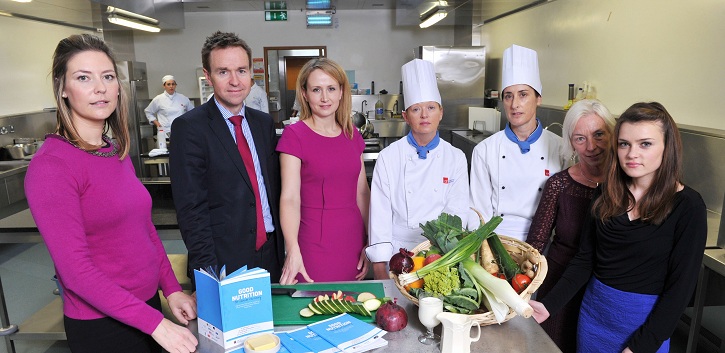2014 Press Releases
Don’t spare the butter…

UCC has produced a new cookbook to help cancer patients put on weight and a cookery demonstration using recipes from the book will take place on Thursday 6th November in the CIT Department of Tourism and Hospitality at 7pm.
Tickets are €10 and are available from www.breakthroughcancerresearch.ie
The majority of patients with advanced cancer experience involuntary weight loss which is related to increased morbidity, decreased quality of life and poor survival.
Recipes for the book were submitted by dietitians, nurses, doctors, celebrity chefs and cancer patients. Many recipes in the book are family favourites, but the ingredients have been enhanced to maximise the calorie intake in small volumes.
The project was funded by the Health Research Board (HRB) which has allowed for the production of 19,000 copies which are available free of charge* to cancer patients.
HRB-funded researcher, Dr Aoife Ryan, dietitian and lecturer in nutritional sciences at UCC and lead author of the book says:
“If you’ve ever watched someone you love suffer from cancer, then you know that one of the side effects is weight loss. This weight loss can be very dramatic and can affect up to 80% of cancer patients. Scientific studies on weight-losing cancer patients have clearly demonstrated that it negatively impacts their quality of life, reduces their ability to tolerate chemotherapy and those that lose more than 10% of their pre-illness weight unfortunately die much faster than weight stable patients”.
“Even though many patients try to eat as much as they can, they are unfortunately dealing with a series of complex changes in their metabolism. The cancer itself produces many ‘hormones’ and ‘chemical messengers’ that break down muscle and fat stores, cause inflammation and reduce appetite. The net result can be rapid weight loss over a short period of time”.
“As a society we are getting more obese and obesity is a big risk factor for cancer, many of the cancer patients we meet today do not ‘look’ malnourished and may in fact still be overweight, but they may have lost a lot of weight very quickly. Research shows that those patients who lose a lot of muscle (which can often not be obvious because they are overweight) get much more toxic side-effects to their chemotherapy and their treatments often have to be reduced or stopped earlier than planned”.
“Getting patients to stop losing weight is a huge challenge and clearly eating nourishing meals, and eating often, is important no matter what weight they are at”.
The cookbook includes information, advice and a bank of nutritious recipes to combat weight loss. Targets for main meals were set at >800 calories and 23g protein and at >300 calories and 5g protein for snacks and desserts.
“Our hope is that this resource will assist anorectic patients in the challenging task of meeting their nutritional requirements and also help to bring enjoyment back to meal time,” says Ms Éadaoin Ní Bhuachalla, research Dietitian and co-author of the book.
The book has been endorsed by the Irish Nutrition & Dietetic Institute (INDI) and the Irish Society of Medical Oncology (ISMO).
Commenting on the book Dr Derek Power, a Consultant Medical Oncologist at Mercy and Cork University Hospitals says:
“Every working day as a cancer specialist patients ask me how they can stop losing weight. Weight loss that is not intended is a devastating condition for patients and I see it most commonly in patients with cancers of the gut (oesophagus, stomach and pancreas) but also in lung cancer and in patients with advanced disease at other organ sites. It hugely impacts their quality of life and also influences their ability to tolerate chemotherapy”. Unfortunately doctors do not really have any medications that safely stimulate appetite or cause weight gain at present. With cutbacks in the health service over the past few years it is not possible for most cancer patients to access a dietician for one-to-one advice. This is why I welcome this wonderful resource and in my opinion it will be an invaluable tool for all patients with eating difficulties during their difficult journey with cancer.”
Dr Graham Love, Chief Executive at the Health Research Board says:
“This recipe book is a brilliant example of how research can be used in a patient friendly way to improve outcomes and assist recovery in cancer patients. That is exactly what our knowledge exchange and dissemination awards are designed to do.”
Developing this cook book was a team effort. It was led by Dr Aoife Ryan and Ms Éadaoin Ní Bhuachalla with valuable input from Dr Derek Power, Consultant Medical Oncologist, Cork and Mercy University Hospitals and Ms Anne O’Connor and Jane Healy, lecturers in the Culinary Arts in the CIT in collaboration with Breakthrough Cancer Research.
*It will be available from oncology centres across Ireland as well as online at www.breakthroughcancerresearch.ie or www.cancercookbook.ie. The book is free but individuals or cancer patients who wish to make a donation to cancer research can text BCR to 50300 to donate €4.
